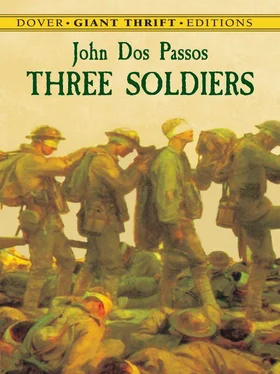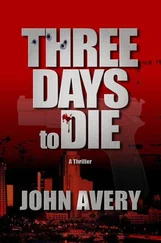“Certainly. Be careful, because it’s loaded,” she said in an offhand manner, walking over to the piano with two volumes under each arm. Andrews closed the chest and followed her, suddenly bubbling with gaiety. He opened a volume haphazard.
“To a friend to dissuade him from starting on a journey,” he read. “Oh, I used to know that.”
He began to play, putting boisterous vigor into the tunes. In a pianissimo passage he heard one cousin whisper to the other:
“Qu’il a l’air intéressant.”
“Farouche, n’est-ce pas? Genre révolutionnaire,” answered the other cousin, tittering. Then he noticed that Mme. Rod was smiling at him. He got to his feet.
“Mais ne vous dérangez pas,” she said.
A man with white flannel trousers and tennis shoes and a man in black with a pointed grey beard and amused grey eyes had come into the room, followed by a stout woman in hat and veil, with long white cotton gloves on her arms. Introductions were made. Andrews’s spirits began to ebb. All these people were making strong the barrier between him and Geneviève. Whenever he looked at her, some well-dressed person stepped in front of her with a gesture of politeness. He felt caught in a ring of well-dressed conventions that danced about him with grotesque gestures of politeness. All through lunch he had a crazy desire to jump to his feet and shout: “Look at me; I’m a deserter. I’m under the wheels of your system. If your system doesn’t succeed in killing me, it will be that much weaker, it will have less strength to kill others.” There was talk about his demobilization, and his music, and the Schola Cantorum. He felt he was being exhibited. “But they don’t know what they’re exhibiting,” he said to himself with a certain bitter joy.
After lunch they went out into the grape arbor, where coffee was brought. Andrews sat silent, not listening to the talk, which was about Empire furniture and the new taxes, staring up into the broad sun-splotched leaves of the grape vines, remembering how the sun and shade had danced about Geneviève’s hair when they had been in the arbor alone the day before, turning it all to red flame. Today she sat in shadow, and her hair was rusty and dull. Time dragged by very slowly.
At last Geneviève got to her feet.
“You haven’t seen my boat,” she said to Andrews. “Let’s go for a row. I’ll row you about.”
Andrews jumped up eagerly.
“Make her be careful, Monsieur Andrews, she’s dreadfully imprudent,” said Madame Rod.
“You were bored to death,” said Geneviève, as they walked out on the road.
“No, but those people all seemed to be building new walls between you and me. God knows there are enough already.”
She looked him sharply in the eyes a second, but said nothing.
They walked slowly through the sand of the river edge, till they came to an old flat-bottomed boat painted green with an orange stripe, drawn up among the reeds.
“It will probably sink; can you swim?” she asked, laughing.
Andrews smiled, and said in a stiff voice:
“I can swim. It was by swimming that I got out of the army.” “What do you mean?”
“When I deserted.”
“When you deserted?”
Geneviève leaned over to pull on the boat. Their heads almost touching, they pulled the boat down to the water’s edge, then pushed it half out on to the river.
“And if you are caught?”
“They might shoot me; I don’t know. Still, as the war is over, it would probably be life imprisonment, or at least twenty years.”
“You can speak of it as coolly as that?”
“It is no new idea to my mind.”
“What induced you to do such a thing?”
“I was not willing to submit any longer to the treadmill.”
“Come, let’s go out on the river.”
Geneviève stepped into the boat and caught up the oars.
“Now push her off, and don’t fall in,” she cried.
The boat glided out into the water. Geneviève began pulling on the oars slowly and regularly. Andrews looked at her without speaking.
“When you’re tired, I’ll row,” he said after a while.
Behind them the village, patched white and buff-color and russet and pale red with stucco walls and steep, tiled roofs, rose in an irregular pyramid to the church. Through the wide pointed arches of the belfry they could see the bells hanging against the sky. Below in the river the town was reflected complete, with a great rift of steely blue across it where the wind ruffled the water.
The oars creaked rhythmically as Geneviève pulled on them.
“Remember, when you are tired,” said Andrews again after a long pause.
Geneviève spoke through clenched teeth:
“Of course, you have no patriotism.”
“As you mean it, none.”
They rounded the edge of a sand bank where the current ran hard. Andrews put his hands beside her hands on the oars and pushed with her. The bow of the boat grounded in some reeds under willows.
“We’ll stay here,” she said, pulling in the oars that flashed in the sun as she jerked them, dripping silver, out of the water.
She clasped her hands round her knees and leaned over towards him.
“So that is why you want my revolver… Tell me all about it, from Chartres,” she said, in a choked voice.
“You see, I was arrested at Chartres and sent to a labor battalion, the equivalent for your army prison, without being able to get word to my commanding officer in the School Detachment… ” He paused.
A bird was singing in the willow tree. The sun was under a cloud; beyond the long pale green leaves that fluttered ever so slightly in the wind, the sky was full of silvery and cream-colored clouds, with here and there a patch the color of a robin’s egg. Andrews began laughing softly.
“But, Geneviève, how silly those words are, those pompous, efficient words: detachment, battalion, commanding officer. It would have all happened anyway. Things reached the breaking point; that was all. I could not submit any longer to the discipline… Oh, those long Roman words, what millstones they are about men’s necks! That was silly, too; I was quite willing to help in the killing of Germans, I had no quarrel with, out of curiosity or cowardice… You see, it has taken me so long to find out how the world is. There was no one to show me the way.”
He paused as if expecting her to speak. The bird in the willow tree was still singing.
Suddenly a dangling twig blew aside a little so that Andrews could see him-a small grey bird, his throat all puffed out with song.
“It seems to me,” he said very softly, “that human society has been always that, and perhaps will be always that: organizations growing and stifling individuals, and individuals revolting hopelessly against them, and at last forming new societies to crush the old societies and becoming slaves again in their turn… ”
“I thought you were a socialist,” broke in Geneviève sharply, in a voice that hurt him to the quick, he did not know why.
“A man told me at the labor battalion,” began Andrews again, “that they’d tortured a friend of his there once by making him swallow lighted cigarettes; well, every order shouted at me, every new humiliation before the authorities, was as great an agony to me. Can’t you understand?” His voice rose suddenly to a tone of entreaty.
She nodded her head. They were silent. The willow leaves shivered in a little wind. The bird had gone.
“But tell me about the swimming part of it. That sounds exciting.”
“We were working unloading cement at Passy-cement to build the stadium the army is presenting to the French, built by slave labor, like the pyramids.”
“Passy’s where Balzac lived. Have you ever seen his house there?”
“There was a boy working with me, the Kid, ‘le gosse,’ it’ld be in French. Without him, I should never have done it. I was completely crushed… I suppose that he was drowned… Anyway, we swam under water as far as we could, and, as it was nearly dark, I managed to get on a barge, where a funny anarchist family took care of me. I’ve never heard of the Kid since. Then I bought these clothes that amuse you so, Geneviève, and came back to Paris to find you, mainly.”
Читать дальше












